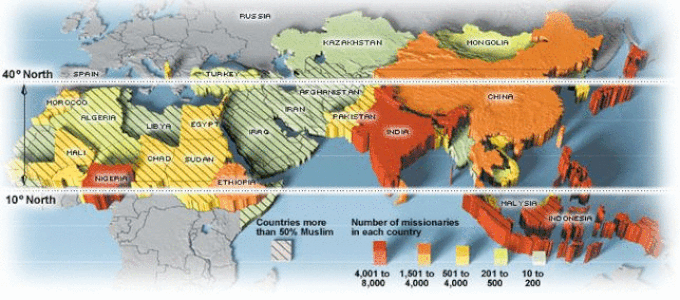|
“If we consider the unblushing promises of reward and the staggering nature of the rewards promised in the Gospels, it would seem that our Lord finds our desires not too strong, but too weak. We are half-hearted creatures, fooling around with drink, sex and ambition when infinite joy is offered us. (The Weight of Glory, C. S. Lewis, Harper One, 1949, page 16).
In one of the parables that illustrates what Lewis is writing about, Jesus says, “but the cares of the world and the deceitfulness of riches and the desires for other things enter in and choke the word, and it proves unfruitful” (Mark 4:19). They also “choke” our desires so we settle for the “weak and worthless…principles of the world” (Galatians 4:9). This is not freedom in Christ! God is working by the Holy Spirit in these days to make followers of Jesus strong in faith so we can “stand firm in the faith” (1 Corinthians 16:13). This is being a true disciple of Jesus with the desires that come from Him. I urge you to ask the Holy Spirit to give you strong desires and put your whole heart into pursuing Christ. Will you use these words of David as a prayer to the Lord? “With my whole heart I seek You; let me not wander from Your commandments!” (Psalm 119:10).
0 Comments
 All that we have said up to this point over the last three days is meaningless unless we understand the value of the prize; the reward. What was it in Paul’s mind and heart that made him run this race so hard and with such determination? Read carefully the verse below. “Indeed, I count everything as loss because of the surpassing worth of knowing Christ Jesus my Lord. For His sake I have suffered the loss of all things and count them as rubbish, in order that I may gain Christ” (Philippians 3:8). Let’s break this verse down into some phrases that give a window into Paul’s heart. · “surpassing worth” – something of exceptional value that really can’t be measured in human terms. It points to something far superior in every respect. · “knowing Christ Jesus” – this is an intimate personal knowledge of the person that can only be gained through close communion and conversation. For Paul, it began on the Damascus road and continued to grow richer and more real as time passed. “My Lord” confirms that this relationship was not merely objective (an idea), but very personal through experience. · Everything else in Paul’s life he could “count…as rubbish.” It was worthless, unwanted trash that would only hinder his pursuit or obtaining the prize if he gave them any value. · He had only one goal; “in order that I may gain Christ.” It was like making the greatest investment possible because it would bring the greatest return and reward. My desire is to inspire you to invest in the same thing Paul did – “Christ Jesus my Lord.” We have been thinking about what it means to “press on toward the goal” – “GLORY!” Paul and Peter have the same objective. “And after you have suffered a little while, the God of all grace, who has called you to His eternal glory in Christ, will Himself restore, confirm, strengthen, and establish you” (1 Peter 5:10). Remember that part of Paul’s goal was to “share His sufferings, becoming like Him in His death” (Philippians 3:10). But the suffering is only for “a little while.” Glory is at the end of this race and suffering will be over.
In the process of running, Peter gives us the assurance that “Christ will Himself restore, confirm, strengthen, and establish you!” We often become weary, and the trials we face wear us down. This promise is for those who endure through the suffering and trials. Because Christ and His glory are the finish line of this race, it is “Himself” that runs with us to the very end. Remember Jesus’ final words to the disciples just before He ascended into heaven; “And behold, I am with you always, to the end of the age” (Matthew 28:20). I was speaking with a dear friend of mine yesterday who has battled depression at various times in his life. He loves the Lord deeply and has grown in his faith over the years. But these moments of depression hit at unexpected times. I pointed him to the ministry of Jesus in Hebrews 7:25; “Consequently, He is able to save to the uttermost those who draw near to God through Him, since He always lives to make intercession for them.” Jesus is praying for him in those moments. As you run toward the goal of glory, Jesus is with you and is praying for you. DO NOT GIVE UP! PRESS ON!  There is more to learn from Paul and his statement in Philippians 3:14 and other references he makes about this same principle. Let’s go back to the first words in this verse; “I press on toward the goal.” Those first three words mean that Paul was “striving energetically with a purpose!” As he says in verse 12, “I press on” knowing that he had not yet reached the goal, but he was pursuing that goal with all his energy. He would not allow other things to distract him from that pursuit. What was the “goal,” the “one thing” that Paul was so intent on reaching. It was “the upward call of God in Christ Jesus.” Was it just “the power of His [Christ’s] resurrection” or “the resurrection from the dead” (3:10-11)? Was there more to this “the upward call of God?” Clearly it is each of the following: · It is “in Christ Jesus” (3:14) · Paul also wanted to “be found in Him” (3:9) · How? Through the righteousness from God “through faith in Christ” (3:9) Hebrews 3:1 calls this prize “a heavenly calling.” In 1 Thessalonians 2:12, Paul “exhorted each one of you and encouraged you and charged you to walk in a manner worthy of God, who calls you into His own kingdom and glory” (1 Thessalonians 2:12). There is no greater goal than the prize of “obtaining the glory of our Lord Jesus Christ” (2 Thessalonians 2:14). What are you putting all your energy into? Does it have this kind of reward?  Over the next few days, I want to focus our attention on what Paul thought was his highest reward. We will begin with Philippians 3:14; “I press on toward the goal for the prize of the upward call of God in Christ Jesus.” How do we “press on toward the goal” or reward? Part of the answer is in the previous verse. “One thing I do: forgetting what lies behind and straining forward to what lies ahead,” (3:13). In most of my dealings with people who have difficulty growing in their walk with the Lord, they are carrying too much weight of past events and failures so they are not able to “strain forward” to reach their prize. Rather than having “one thing” as their objective, they fill their lives with “things” that distract, confuse priorities, and weaken their spiritual strength and endurance. That phrase (“straining forward”) gives us the picture of a runner leaning forward as he runs, putting every movement of his body into reaching his goal as quickly as possible. There are no wasted movements or energy, but his mind is bent on the efficiency of his body so that he reaches the finish line and receives the prize. What “lies ahead” for you? What is your goal and prize? We will discuss this more tomorrow. While you are thinking about this issue in your life, reread Hebrews 12:1-2 and ask the Lord to reveal any “weight and sin which clings so closely” so you can repent of it and get it removed.  After a dear friend risked his life to reach an unengaged people group with the gospel and paid the ultimate price, I have given my part in this much thought. We in western cultures live in conditions that are fairly safe and I fear we have become far too passive in our thinking, and therefore passive in our prayers. Right in the middle of verses that deal with many personal issues, Hebrews 13:3 gives us this instruction: “Remember those who are in prison, as though in prison with them, and those who are mistreated, since you also are in the body.” The force of that phrase I underlined means that you actually see yourself alongside the person in prison, or suffering for their faith in Christ, or rejected by their own family. When we do this, we are no longer being passive in our feelings and prayer for them. We have even a stronger example of this in the Lord Jesus. “Surely he has borne our griefs and carried our sorrows; yet we esteemed him stricken, smitten by God, and afflicted.” (Isaiah 53:4). Notice how the prophecy exposes the human problem of misinterpreting the suffering of Jesus when in fact He took on Himself what we would experience before we go through the experience. At the healing of Peter’s mother-in-law and others, Matthew says “This was to fulfill what was spoken by the prophet Isaiah: “He took our illnesses and bore our diseases”” (Matthew 8:17) looking back to Isaiah 53:4. Jesus clearly identified with the suffering we go through. As having His Spirit, we must do the same if we are going to represent Jesus to others who are suffering in the body of Christ. Over the last two days I have given a very brief review of two countries, China and India, with regard to the people groups that need to be reached with the gospel. In both countries, there is a clear rise in persecution against Christians. From personal surveillance technology and rewards given for turning in Christians to the government, to church leaders missing or imprisoned, the conditions worsen and will become more difficult.
The increase in violence against Christians in India since 2014 has meant that many missionaries have left the country. The ruling Hindu government has openly pushed to cleanse their country of Islam and Christianity. China is quietly deporting foreigners who are known to be involved in religious activities. What should be our attitude toward these events which are happening in many places around the world? This question takes us back to the final instructions of Jesus just before His crucifixion. “Remember the word that I said to you: ‘A servant is not greater than his master.’ If they persecuted Me, they will also persecute you. If they kept My word, they will also keep yours” (John 15:20). Earlier in verse 18, Jesus told the disciples also that because the world has hated Him, they should expect that the world would also hate them. History has also proven that the gospel flourishes best in conditions that are opposed to it. While we should pray for those in government authority (1 Timothy 2:1-2), we must also be diligent in praying for those who carry the gospel to those who have never heard. This was Paul’s plea: “At the same time, pray also for us, that God may open to us a door for the word, to declare the mystery of Christ, on account of which I am in prison--” (Colossians 4:3). PRAY!  Next to India, China is also a great challenge for reaching the Unreached People Groups. In fact, according to Finishing the Task, there are 58 Unengaged People Groups in China and none in India. What is the difference between an Unreached People Group and an Unengaged People Group? While there are minor differences in the definition of these groups, here are descriptions I have put together that might help clarify the terms. · Unengaged People Group – A group of people bound together by language, culture and ethnic ties, with no Christian witness or missionaries, no Bible (or portion of the Bible) translated into their language, and no church. · Unreached People Group - A group of people bound together by language, culture and ethnic ties, with less than 2% of the population as followers of Jesus. With those definitions in mind, consider the need in China. Remember the challenge I raised yesterday regarding India, that we need to awaken the indigenous church to realize its responsibility to proclaim the gospel to their own. As you read the follow statistics, pray for China and ask God to raise up godly persons to train indigenous leaders who will train others to be faithful in fulfilling the task of the Great Commission (Matthew 28:19-20; 2 Timothy 2:2). China: · Number of People Groups in China = 545 · Number of Unreached People groups = 445 (81.7%) · Total population of China = 1,401,456,000 · Population of the Unreached People Groups = 146,230,000 (10.4%) · Largest Religion = Ethnic Religions · Population Professing Christianity = 9.2% · Unengaged People Groups = 58  While there are many unreached people groups in the countries that fit into what is called the 10/40 window (see map), India poses the largest challenge. Here are some numbers to digest. · Number of People Groups in India = 2,585 · Number of Unreached People groups = 2,311 or 89.4% · Total population of India = 1,347,994,000 · Population of the Unreached People Groups = 1,293,515,000 · Largest Religion = Hinduism (80.9%) · Population Professing Christianity = 2.1% What would missionary to India, William Carey (1761 to 1834), say if he read these numbers (above)? The progress in reaching India with the gospel has been far less than it should be. What has hindered this progress and how can we promote movements of God that will rapidly get the gospel to these groups and establish disciples into self-sustaining, self-governing, and self-propagating churches? More money is not the answer. Neither is it more buildings, schools or hospitals. I agree with Rick Wood (Mission Frontiers); “sending tens of thousands of missionaries to India to “convert” people from any other religion to join the Christian church is not…a biblical plan” (May/June 2019). What is needed and must be done is the awakening of the indigenous church to realize its responsibility to proclaim the gospel to their own. We have seen how the Western church model has become a stumbling block with its emphasis on money and buildings. It is time to return to God’s word and again observe the biblical model.  Anyone with a heart for those who have never heard the gospel of Jesus Christ – not even heard His name – fulfilling the “Great Commission” seems like a goal we can never reach. As we look at the numbers today; 7098 unreached people groups and of that number, 269 are unengaged with a population over 500, we wonder how the task will be completed in our generation or the next. We must begin with accepting the authority of Scripture. Without this principle embedded in our souls, there is no reason to aim at such a large task. With agreement in the authority of Scripture, we can accept that Matthew 24:14 will be accomplished; “And this gospel of the kingdom will be proclaimed throughout the whole world as a testimony to all nations, and then the end will come.” The timing is not the point. The fact that God is sending out workmen into these fields is the point we need to focus on. Do we have the heart for being sent? Trying to gather enough resources together in not the issue either. What is need in the Church today is willing hearts. Listen to the intention of Paul’s heart: “I make it my ambition to preach the gospel, not where Christ has already been named, lest I build on someone else’s foundation” (Romans 15:20). Paul was not saying that he would preach to all who had not heard, but it was his ambition and “earnest aspiration and goal.” He left the numbers and the “how” to God. As we have proven in this ministry, God supplies what is needed as we set our hearts on following the biblical model and Paul’s method. There are around 800 churches in the world for every unreached people group. If only one or two churches in each 800 saw the need from God’s perspective, the task could be finished very quickly. What is your ambition? |
Archives
December 2023
Link To Our Old Blog:
|

 RSS Feed
RSS Feed